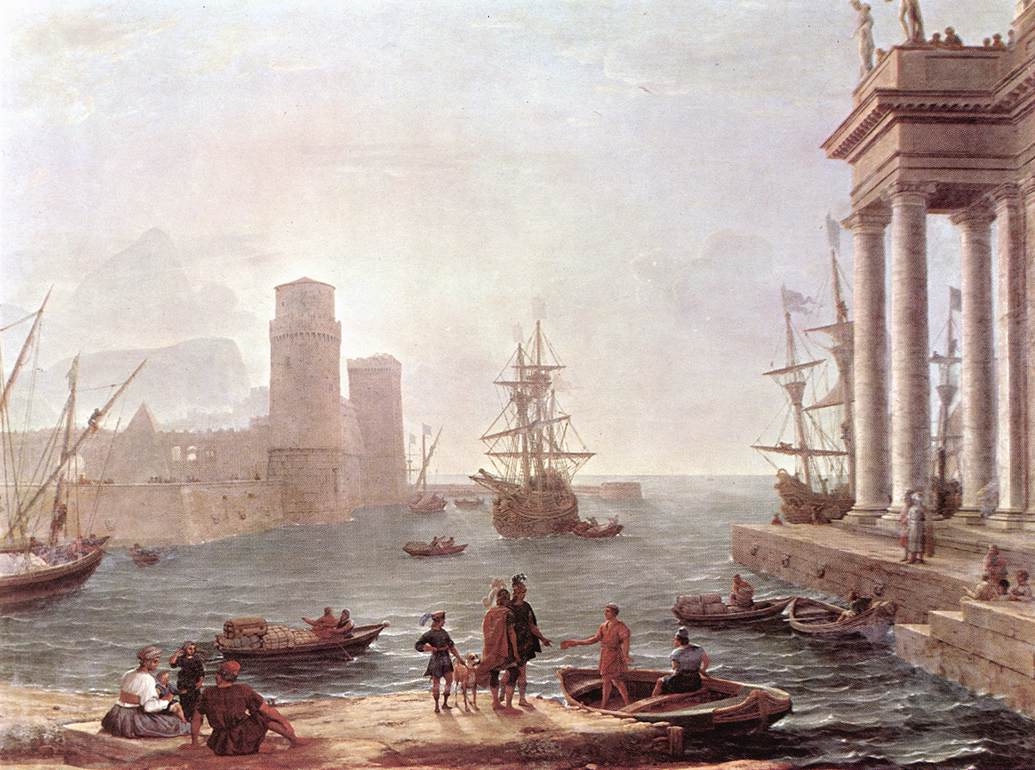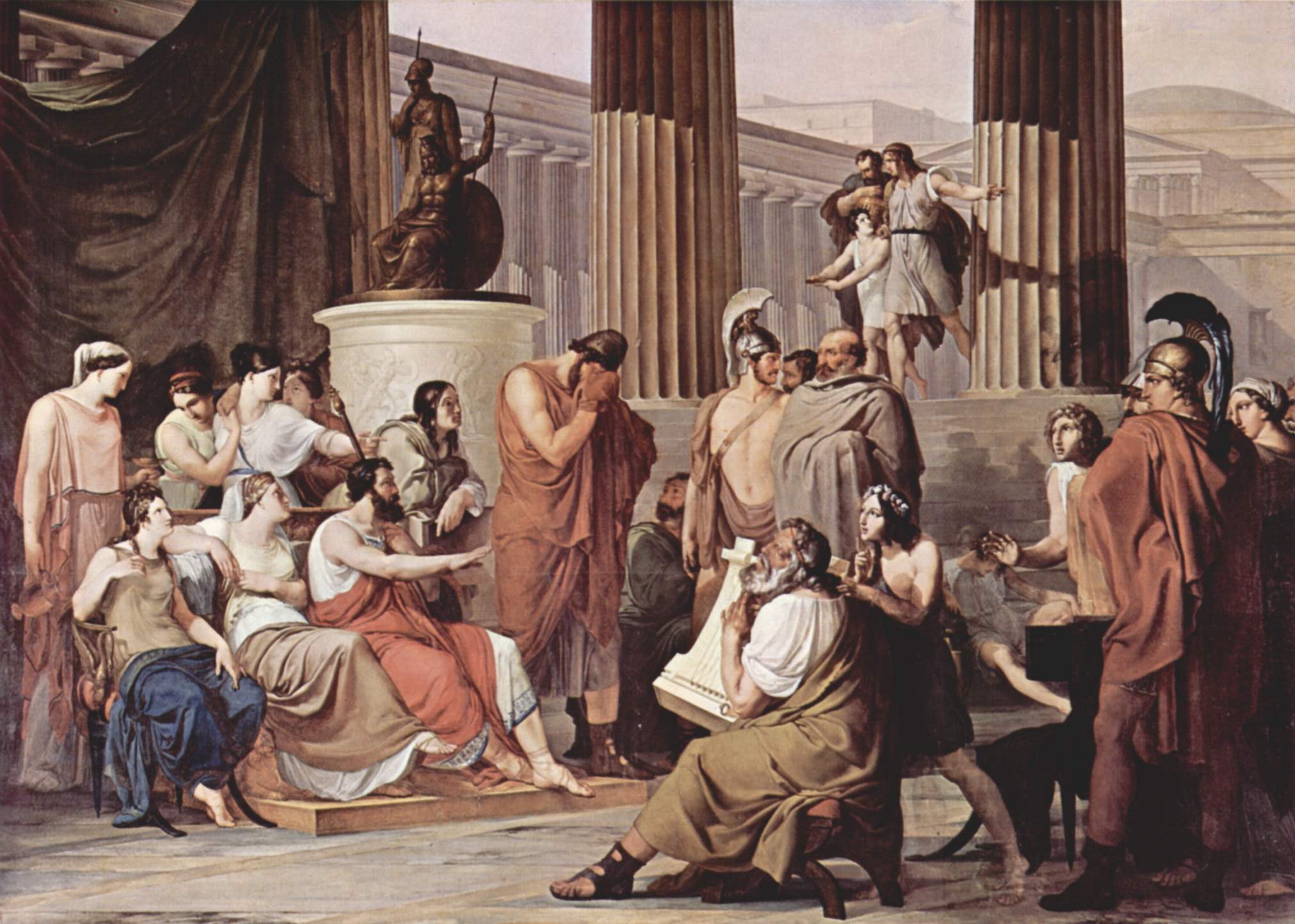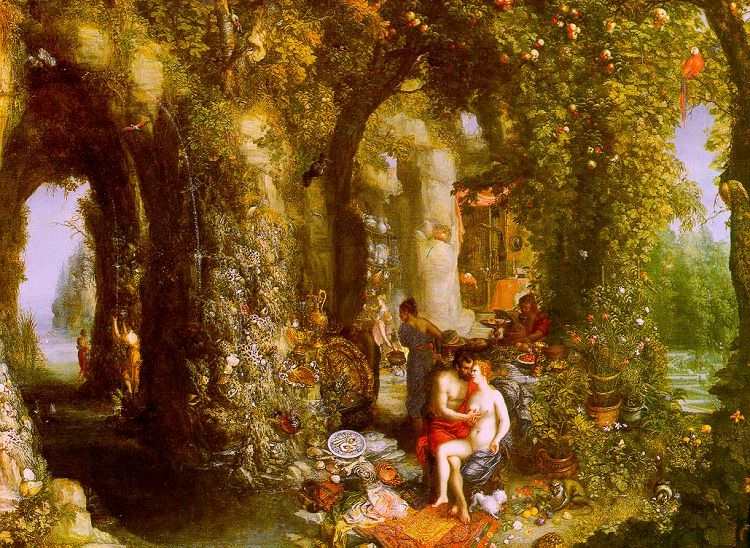|
Scheria
Scheria or Scherie (; grc, Σχερία or ), also known as Phaeacia () or Faiakia was a region in Greek mythology, first mentioned in Homer's ''Odyssey'' as the home of the Phaeacians and the last destination of Odysseus in his 10-year journey before returning home to Ithaca. It is one of the earliest descriptions of a utopia. From Ogygia to Scheria (Odysseus) Before leaving Ogygia, Odysseus builds a raft and sails eastwards, instructed by Calypso to navigate using the stars as a celestial reference point. On the eighteenth day appear the shadowy mountains of the land of the Phaeacians, that looked like a ''shield'' in the misty deep. Poseidon spots his raft and seeking vengeance for his son Polyphemus who was blinded by Odysseus, produces a storm that torments Odysseus. After three days of struggle with the waves, he is finally washed up on Scheria. Odysseus meets Nausicaa Meanwhile, the goddess Athena sneaks into the palace, disguised as a sea-captain's daughter, and instru ... [...More Info...] [...Related Items...] OR: [Wikipedia] [Google] [Baidu] |
Corfu
Corfu (, ) or Kerkyra ( el, Κέρκυρα, Kérkyra, , ; ; la, Corcyra.) is a Greek island in the Ionian Sea, of the Ionian Islands, and, including its small satellite islands, forms the margin of the northwestern frontier of Greece. The island is part of the Corfu regional unit, and is administered by three municipalities with the islands of Othonoi, Ereikoussa, and Mathraki.https://corfutvnews.gr/diaspasi-deite-tin-tropologia/ The principal city of the island (pop. 32,095) is also named Corfu. Corfu is home to the Ionian University. The island is bound up with the history of Greece from the beginnings of Greek mythology, and is marked by numerous battles and conquests. Ancient Korkyra took part in the Battle of Sybota which was a catalyst for the Peloponnesian War, and, according to Thucydides, the largest naval battle between Greek city states until that time. Thucydides also reports that Korkyra was one of the three great naval powers of fifth century BC Greece, alo ... [...More Info...] [...Related Items...] OR: [Wikipedia] [Google] [Baidu] |
Arete (mythology)
Francesco Hayez, ''Ulysses at the court of Alcinous'', 1814-1815. Arete is depicted on the left, sitting between Nausicaa and Alcinous. In Greek mythology, Queen Arete (; Ancient Greek: means "she who is prayed for") of Scheria was the wife of Alcinous and mother of Nausicaa and Laodamas. Biography Arete was the daughter of Rhexenor. She was a descendant of Poseidon, who, making love to Periboea, begot Nausithous, who in turn had two sons, Rhexenor, her father and Alcinous, her uncle and later on, her husband. Her name appears to be associated with the Ionic noun ἀρητή, meaning "sacred", "cursed" or "prayed." Some sources claim that it means "righteous", while others connect it with Ares, the Greek god of war. Mythology Argonautica Arete was also depicted as an intelligent and generous hostess by Apollonius in Book 4 of the ''Argonautica'', where he recounts the story of Jason and Medea. When the Argonauts arrived at the island, Arete and her husband receiv ... [...More Info...] [...Related Items...] OR: [Wikipedia] [Google] [Baidu] |
Nausicaa
Nausicaa (; grc, Ναυσικάα, Nausikáa, or , ) also spelled Nausicaä or Nausikaa, is a character in Homer's ''Odyssey''. She is the daughter of King Alcinous and Queen Arete of Phaeacia. Her name means "burner of ships" ( 'ship'; 'to burn'). Role in the ''Odyssey'' In Book Six of the ''Odyssey'', Odysseus is shipwrecked on the coast of the island of Scheria (Phaeacia in some translations). Nausicaä and her handmaidens go to the seashore to wash clothes. Awakened by their games, Odysseus emerges from the forest completely naked, scaring the servants away, and begs Nausicaä for aid. She gives Odysseus some of the laundry to wear and takes him to the edge of the town. Realizing that rumors might arise if Odysseus is seen with her, she and the servants go into town ahead of him, but first she advises him to go directly to Alcinous's house and make his case to Nausicaä's mother, Arete. Arete is known as wiser even than Alcinous, and Alcinous trusts her judgment. Odysseu ... [...More Info...] [...Related Items...] OR: [Wikipedia] [Google] [Baidu] |
Odyssey
The ''Odyssey'' (; grc, Ὀδύσσεια, Odýsseia, ) is one of two major Ancient Greek literature, ancient Greek Epic poetry, epic poems attributed to Homer. It is one of the oldest extant works of literature still widely read by modern audiences. As with the ''Iliad'', the poem is divided into 24 books. It follows the Greek hero cult, Greek hero Odysseus, king of Homer's Ithaca, Ithaca, and his journey home after the Trojan War. After the war, which lasted ten years, his journey lasted for ten additional years, during which time he encountered many perils and all his crew mates were killed. In his absence, Odysseus was assumed dead, and his wife Penelope and son Telemachus had to contend with a Suitors of Penelope, group of unruly suitors who were competing for Penelope's hand in marriage. The ''Odyssey'' was originally composed in Homeric Greek in around the 8th or 7th century BCE and, by the mid-6th century BCE, had become part of the Greek literary canon. In Classic ... [...More Info...] [...Related Items...] OR: [Wikipedia] [Google] [Baidu] |
Utopia
A utopia ( ) typically describes an imaginary community or society that possesses highly desirable or nearly perfect qualities for its members. It was coined by Sir Thomas More for his 1516 book ''Utopia (book), Utopia'', describing a fictional island society in the New World. However, it may also denote an intentional community. In common parlance, the word or its adjectival form may be used synonymously with "impossible", "far-fetched" or "deluded". Hypothetical utopias focus on—amongst other things—equality, in such categories as economics, government and justice, with the method and structure of proposed implementation varying based on ideology. Lyman Tower Sargent argues that the nature of a utopia is inherently contradictory because societies are not homogeneous and have desires which conflict and therefore cannot simultaneously be satisfied. To quote: The opposite of a utopia is a dystopia or cacotopia. Utopian and dystopian fiction has become a popular literary catego ... [...More Info...] [...Related Items...] OR: [Wikipedia] [Google] [Baidu] |
Demodocus (Odyssey Character)
In the ''Odyssey'' by Homer, Demodocus (; grc-gre, Δημόδoκος, ''Demodokos'') is a poet who often visits the court of Alcinous, king of the Phaeacians on the island of Scherie. During Odysseus' stay on Scherie, Demodocus performs three narrative songs. Description Demodocus first appears at a feast in the hall of Alcinous, after he approved that Odysseus should be provided with a ship for a safe passage home. During the feast Demodocus sings about the disagreement between Odysseus and Achilles at Troy. Everyone enjoys the singing except for Odysseus who bursts into tears because of the pain and suffering of which the song reminds him. Odysseus would raise his cup and pour libations to the gods every time there was a pause in the singing but when Demodocus began again Odysseus would pull his cloak over his head to hide his tears. Only Alcinous noticed Odysseus' weeping and stopped the feast and suggests that everyone go outdoors to participate in athletic contests. T ... [...More Info...] [...Related Items...] OR: [Wikipedia] [Google] [Baidu] |
Trojan War
In Greek mythology, the Trojan War was waged against the city of Troy by the Achaeans (Greeks) after Paris of Troy took Helen from her husband Menelaus, king of Sparta. The war is one of the most important events in Greek mythology and has been narrated through many works of Greek literature, most notably Homer's ''Iliad''. The core of the ''Iliad'' (Books II – XXIII) describes a period of four days and two nights in the tenth year of the decade-long siege of Troy; the ''Odyssey'' describes the journey home of Odysseus, one of the war's heroes. Other parts of the war are described in a cycle of epic poems, which have survived through fragments. Episodes from the war provided material for Greek tragedy and other works of Greek literature, and for Roman poets including Virgil and Ovid. The ancient Greeks believed that Troy was located near the Dardanelles and that the Trojan War was a historical event of the 13th or 12th century BC, but by the mid-19th century AD, both the ... [...More Info...] [...Related Items...] OR: [Wikipedia] [Google] [Baidu] |
Alcinous
In Greek mythology, Alcinous (; Ancient Greek: Ἀλκίνους or Ἀλκίνοος ''Alkínoös'' means "mighty mind") was a son of Nausithous and brother of Rhexenor. After the latter's death, he married his brother's daughter Arete who bore him Nausicaa, Halius, Clytoneus and Laodamas. In some accounts, Alcinous' father was Phaeax, son of Poseidon and Corcyra, and brother of Locrus.Conon, ''Narrations'' 3 Mythology Argonautica In the myth of Jason and the Argonauts, Alcinous is represented as living with his wife Arete on Drépané island. The Argonauts, on their return from Colchis, came to his island, and were hospitably received. When the Colchians, in their pursuit of the Argonauts, likewise arrived in Drépané, and demanded that Jason's lover Medea should be delivered up to them, Alcinous declared that if she was still a virgin she should be restored to them, but if she was already the wife of Jason, he would protect her and her husband against the Colchia ... [...More Info...] [...Related Items...] OR: [Wikipedia] [Google] [Baidu] |
Odysseus And Nausicaa
Odysseus ( ; grc-gre, Ὀδυσσεύς, Ὀδυσεύς, OdysseúsOdyseús, ), also known by the Latin variant Ulysses ( , ; lat, UlyssesUlixes), is a legendary Greek king of Ithaca and the hero of Homer's epic poem the ''Odyssey''. Odysseus also plays a key role in Homer's ''Iliad'' and other works in that same epic cycle. Son of Laërtes and Anticlea, husband of Penelope, and father of Telemachus and Acusilaus, Odysseus is renowned for his intellectual brilliance, guile, and versatility (''polytropos''), and is thus known by the epithet Odysseus the Cunning ( grc-gre, μῆτις, mêtis, cunning intelligence). He is most famous for his ''nostos'', or "homecoming", which took him ten eventful years after the decade-long Trojan War. Name, etymology, and epithets The form ''Odys(s)eus'' is used starting in the epic period and through the classical period, but various other forms are also found. In vase inscriptions, we find the variants ''Oliseus'' (), ''Olyseus'' (), ... [...More Info...] [...Related Items...] OR: [Wikipedia] [Google] [Baidu] |
Odysseus
Odysseus ( ; grc-gre, Ὀδυσσεύς, Ὀδυσεύς, OdysseúsOdyseús, ), also known by the Latin variant Ulysses ( , ; lat, UlyssesUlixes), is a legendary Greek king of Ithaca and the hero of Homer's epic poem the ''Odyssey''. Odysseus also plays a key role in Homer's ''Iliad'' and other works in that same epic cycle. Son of Laërtes and Anticlea, husband of Penelope, and father of Telemachus and Acusilaus, Odysseus is renowned for his intellectual brilliance, guile, and versatility (''polytropos''), and is thus known by the epithet Odysseus the Cunning ( grc-gre, μῆτις, mêtis, cunning intelligence). He is most famous for his ''nostos'', or "homecoming", which took him ten eventful years after the decade-long Trojan War. Name, etymology, and epithets The form ''Odys(s)eus'' is used starting in the epic period and through the classical period, but various other forms are also found. In vase inscriptions, we find the variants ''Oliseus'' (), ''Olyseus'' (), ... [...More Info...] [...Related Items...] OR: [Wikipedia] [Google] [Baidu] |
Ogygia
Ogygia (; grc, Ὠγυγίη, Ōgygíē , or ''Ōgygíā'' ) is an island mentioned in Homer's ''Odyssey'', Book V, as the home of the nymph Calypso, the daughter of the Titan Atlas. In Homer's ''Odyssey'', Calypso detained Odysseus on Ogygia for seven years and kept him from returning to his home of Ithaca, wanting to marry him. Athena complained about Calypso's actions to Zeus, who sent the messenger Hermes to Ogygia to order Calypso to release Odysseus. Hermes is Odysseus's great grandfather on his mother's side, through Autolycos. Calypso finally, though reluctantly, instructed Odysseus to build a small raft, gave him food and wine, and let him depart the island. The ''Odyssey'' describes Ogygia as follows: Location Ogygia or Phaeacia has been associated with the putative sunken Atlantis. A long-standing tradition begun by Euhemerus in the late 4th century BC and supported by Callimachus, endorsed by modern Maltese tradition, identifies Ogygia with the island o ... [...More Info...] [...Related Items...] OR: [Wikipedia] [Google] [Baidu] |
History Of Navigation
The history of navigation, or the history of seafaring, is the art of directing vessels upon the open sea through the establishment of its position and course by means of traditional practice, geometry, astronomy, or special instruments. Many peoples have excelled as seafarers, prominent among them the Austronesians (Islander Southeast Asians, Malagasy, Islander Melanesians, Micronesians, and Polynesians), the Harappans, the Phoenicians, the Iranians, the ancient Greeks, the Romans, the Arabs, the ancient Indians, the Norse, the Chinese, the Venetians, the Genoese, the Hanseatic Germans, the Portuguese, the Spanish, the English, the French, the Dutch, and the Danes. Antiquity Indo-Pacific Navigation in the Indo-Pacific began with the maritime migrations of the Austronesians from Taiwan who spread southwards into Island Southeast Asia and Island Melanesia during a period between 3000 and 1000 BC. Their first long-distance voyaging was the colonization of Micronesi ... [...More Info...] [...Related Items...] OR: [Wikipedia] [Google] [Baidu] |



.jpg)




